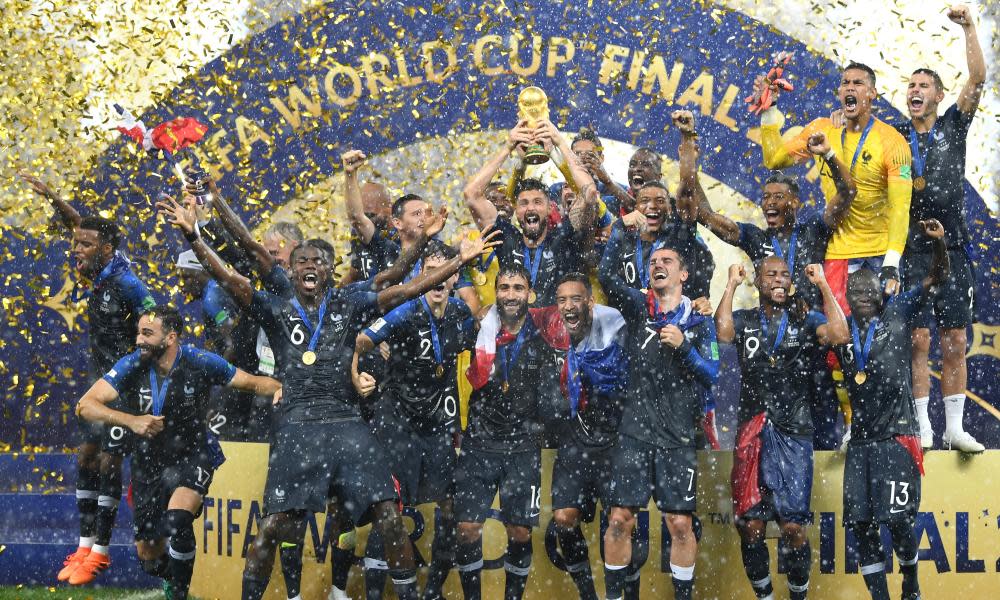France squandered the unity of its last World Cup win. This time must be different

France’s recent history with football has been tightly linked to the struggle over its identity. For decades, politicians have used the diversity of the national team either as a symbol of integration at work, or as a warning of Le Grand Remplacement (the big replacement) – that “ethnically French” citizens are being excluded by those whose roots lie in Africa.
Following France’s win, the far-right writer Renaud Camus has retweeted videos criticising diversity in France. More than half the squad are of African origin, including key players Paul Pogba, Kylian Mbappé and N’Golo Kanté, so the team in some ways represents his greatest fears. Yet the scenes of celebration on the Champs-Élysées and beyond show how France has claimed these players. It feels like the breath of fresh air that France has so badly needed, after the trauma following the terror attacks of recent years, and an election in which the far-right Front National made the final presidential runoff. In this context, it would seem logical for Emmanuel Macron to try to use this sporting triumph to bolster his image as a successful, positive and inclusive world leader.
But we’ve been here before and most can remember how this played out last time. In 1996, two years before France first won the World Cup, an Algerian Islamist group detonated a bomb on the Paris metro, killing four. The 1998 team were hailed as the answer to the country’s divisions and nicknamed “black, blanc, beur” (black, white or Arab), in reference to the players such as Zinedine Zidane and Lilian Thuram who were the children of Arab and African migrants.
The players were used as a form of propaganda by the president, Jacques Chirac; paraded in front of the media and required to represent a country that was far more progressive and united than France really was. Four years later, Jean-Marie Le Pen shocked the country by making it through to the second round of the presidential elections. If France’s team was representing a united and multicultural country, how could this have happened?
Speaking in the 2016 documentary Les Bleus, the 1998 goalkeeper for France, Bernard Lama, raised the point that the young men who had committed the recent attacks in France were French nationals of the 98 generation. The World Cup wasn’t enough to fix the underlying problems and, 20 years on, France has the same ingredients of terror attacks, the far right – and a diverse, winning, national football team.
The fact is that, as wonderful as football is as a sport, the jubilation of a World Cup win can only be ephemeral, so long as politicians don’t build on the energy it creates. This national win could only be a catalyst for change if Macron decides to act on it.
As it stands, the French president is incredibly unpopular with young people, despite trying to present himself as a youthful candidate for change. In recent months he has faced a standoff with students who organised mass sit-ins across the country to protest against his changes to university entry requirements, and youth unemployment in France is at 21.5%. It’s felt most acutely in Paris neighbourhoods such as Bondy and Saint-Denis, where Mbappé was raised. In the most deprived areas, youth unemployment is as high as 40%.
In these places, footballers are hailed as heroes not just when they win a World Cup, but just for signing at a lower league club – for breaking a cycle of poverty when the life chances for young people in these areas are so low.
This success has nothing to do with government policies, and everything to do with the skill and determination of the individuals. France star player Ousmane Dembélé is an example of this. In a recent documentary, Dembélé speaks about his neighbourhood as being his strength. “It’s helped me to become a good person,” he says. “I won’t forget where I’m from because we have dealt with things that other people haven’t.”
Within hours of the victory, the cracks were beginning to show. Police clashed with revellers and suspended public transport to the suburbs, preventing many young people from joining in the celebration.
If Macron really wants to claim this win, he has to invest in these communities to give them opportunities beyond football. The players have proven themselves, twice over, as French citizens, and given hope to the nation: it’s now Macron’s job to give hope to their communities.
• Iman Amrani is an Algerian British journalist

 Yahoo News
Yahoo News 
